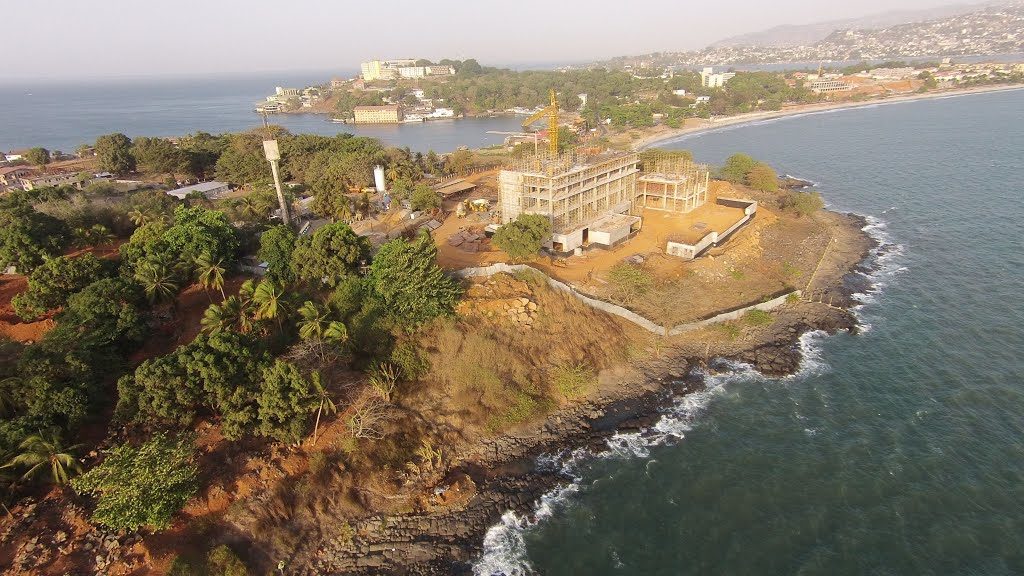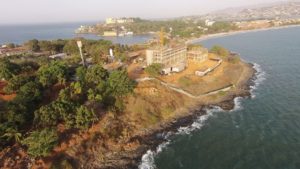Image by Simon Boots
I’d always wanted to volunteer in a developing country, motivated like many by an interest in applying my skills to help a place in great need. I was attracted to the strong partnership ethos of King’s Sierra Leone Partnership (KSLP) and delighted to have the chance to come and work with Connaught Hospital colleagues.
I joined the NHS as a graduate general management trainee in 2009, after which I worked in various operational and strategic roles including most recently as Programme Director for Diabetes and Stroke Prevention at Health Innovation Network (HIN), the South London Academic Health Science Network. I am grateful to my managers at HIN for kindly allowing me a six month career break to come to KSLP in Freetown.
During my first month at Connaught I was struck by how hospital life is on the one hand of course so totally different, and yet on the other hand many of the issues are similar to the ones that NHS managers devote their careers to solving.
Probably the most striking difference is the spectrum of common diseases. Infectious diseases (such as TB, malaria, HIV, measles, meningitis, pneumonia and others) are very prevalent. Spending time observing in an outpatient clinic during my second week here I was also taken aback by the severity of advanced disease that Connaught staff are treating. In my years in UK hospitals I have never seen so many patients so poorly as I have seen here in just a few weeks.
But while there is what sometimes feels like an overwhelming amount of suffering, there is also a good deal of hope. Patients, relatives and staff are incredibly warm and friendly, greeting strangers they pass in the corridor and one person who I hadn’t met before thanked me profusely for my work! I have met some incredibly strong and resilient people here who have survived some terrible times and are committed to working towards a better healthcare system. The work they do every day is truly impressive and humbling, particularly when you remember that they have far fewer resources of all types than we do in the NHS.
The issues that Connaught has in common with the NHS that I’ve discovered so far are as follows (I’m sure there are more!):
- Issues around flow of patients through the hospital – together with Connaught doctors and nurses we’ve started some process mapping to better understand the problems before co-designing solutions
- Rotas and handover processes
- Ways to embed effective multi-disciplinary working
- Estates and maintenance issues
- Effective management of outpatient services and ensuring patients do not become lost to follow up
- Health records management
- Robust systems for audit and quality improvement
And it’s the last two issues where I am focussing my energies for now.
There’s a great deal of enthusiasm in the hospital for improving the health records system, both to improve patient safety and care quality as well as enabling staff to undertake meaningful clinical audits and quality improvement projects. The records office staff in particular are fantastic and we have been working together on the first stages of our improvement plan.
It’s also a fascinating process working with colleagues to start up a rolling programme of quality improvement projects. We’ve established a committee where projects can be proposed, registered and reported on when completed. Our first two projects are about implementing the new international guidelines for the treatment of malaria and improving antibiotic prescribing. We’re going to be running some multi-disciplinary training sessions soon on quality improvement tools and methods. I am learning a lot from colleagues here showing me what is likely to be effective and what is not, and why.
My third project is an evaluation of a major educational programme working with the medical, nursing and pharmacy schools at the College of Medical and Allied Health Sciences (COMAHS). I’m developing some new skills in designing qualitative evaluations and it will be interesting to hear the views of staff and students in the focus groups and interviews early next year.
I’ve always thought that the role of an effective healthcare manager is to provide the best possible environment and conditions for clinicians and patients, so that the best possible patient outcomes are achieved. This means making sure that systems work and that staff have the right skills, equipment and support to meet patients’ needs. As one of my first managers in the NHS memorably put it, “you have to be the glue” that brings the various parts of the system together. These principles are exactly the same here. I’m enjoying learning about how the Connaught management team is approaching this task and trying to make the best contribution I can.
Volunteering overseas is a “less trodden path” for healthcare managers than it is for clinicians, but I would encourage anyone who has an interest to pursue it and get in touch via volunteer@kslp.org.uk if you would like to know more. Whilst there are some tough times, it’s an incredible and very worthwhile experience.
Laura’s blog was first published on the King’s Sierra Leone Partnership (KSLP) website here.
If you would like to learn more about the opportunities to volunteer with KSLP in Freetown, you can find out more, including how to apply, here.
KSLP is a partnership between King’s Health Partners – itself a partnership between King’s College London, and Guy’s and St Thomas’, King’s College Hospital and South London and Maudsley NHS Foundation Trusts – and three key Sierra Leonean institutions; Connaught Hospital, The College of Medical and Allied Health Sciences (COMAHS), and The Ministry of Health and Sanitation.

